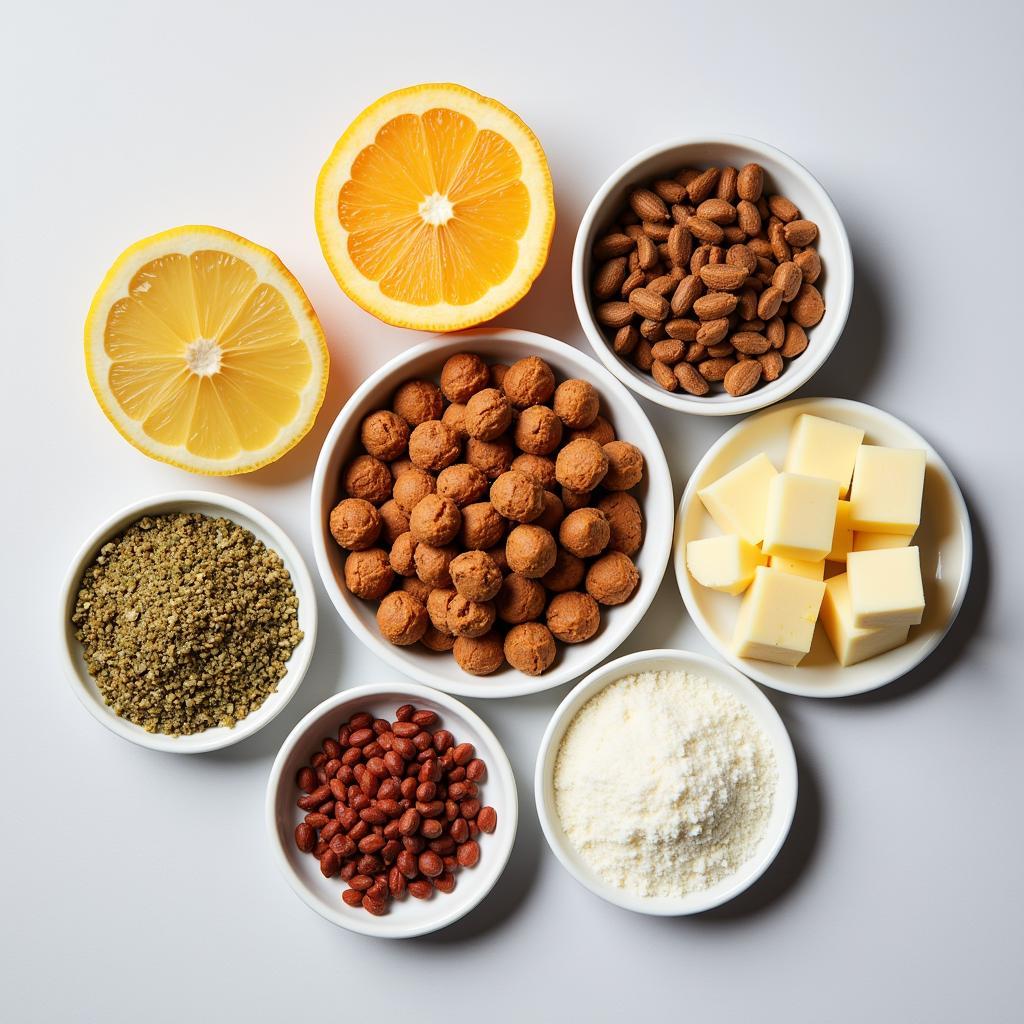Low Residue Cat Food is a specialized diet formulated to minimize the amount of undigested food that passes through your cat’s digestive system. This type of food is particularly beneficial for cats experiencing digestive issues such as diarrhea, constipation, or inflammatory bowel disease (IBD).
 Low Residue Cat Food Ingredients
Low Residue Cat Food Ingredients
What Makes Low Residue Cat Food Different?
Unlike regular cat food, low residue cat food focuses on highly digestible ingredients that are easily broken down and absorbed by the digestive system. This reduces the frequency and volume of your cat’s stool, providing relief from gastrointestinal discomfort.
Key features of low residue cat food include:
- Highly digestible protein sources: Opting for easily digestible proteins like chicken, turkey, or fish ensures minimal strain on your cat’s digestive system.
- Limited fiber content: While fiber is essential for digestive health, low residue cat food typically contains a reduced amount to minimize bulk in the intestines.
- Low-fat content: Limiting fat intake can help reduce the likelihood of diarrhea and ease digestion.
When to Consider Low Residue Cat Food
Your veterinarian might recommend low residue cat food if your feline friend experiences:
- Diarrhea: This type of food can help firm up stool and reduce the frequency of bowel movements.
- Constipation: Although counterintuitive, low residue cat food can sometimes help regulate bowel movements in cats experiencing constipation.
- Inflammatory Bowel Disease (IBD): Reducing digestive irritation through a bland, easily digestible diet can help manage IBD symptoms.
- Food allergies or sensitivities: Limited ingredient diets, often low in residue, can help pinpoint and avoid potential food allergens.
Choosing the Right Low Residue Cat Food
Selecting the appropriate low residue cat food for your furry companion requires careful consideration and consultation with your veterinarian.
Here are some factors to consider:
- Ingredients: Look for highly digestible protein sources, limited fiber content, and easily digestible carbohydrates.
- Life stage: Choose a formula specifically designed for your cat’s age (kitten, adult, senior) and life stage (pregnancy, lactation).
- Brand reputation: Opt for reputable brands known for high-quality ingredients and strict manufacturing processes.
Transitioning to Low Residue Cat Food
Transitioning your cat to a new diet, even a low residue one, should be done gradually to avoid digestive upset.
- Start by mixing a small amount of the new food with your cat’s current food.
- Gradually increase the proportion of low residue cat food over 7-10 days.
- Monitor your cat for any signs of digestive issues during the transition.
Beyond Diet: Supporting Your Cat’s Digestive Health
While low residue cat food plays a significant role in managing digestive issues, other factors contribute to your cat’s overall digestive well-being.
- Hydration: Encourage your cat to drink plenty of water to maintain proper hydration and support healthy digestion.
- Probiotics: Consider adding a probiotic supplement to your cat’s diet to promote a healthy balance of gut bacteria.
- Stress reduction: Stress can significantly impact digestive health. Provide a calm and enriching environment for your feline companion.
Frequently Asked Questions
1. Can I make homemade low residue cat food?
While it’s possible to prepare homemade meals for your cat, it’s crucial to consult with a veterinary nutritionist to ensure the diet is balanced and meets your cat’s specific needs.
2. How long should my cat stay on low residue cat food?
The duration depends on the underlying digestive issue and your veterinarian’s recommendations. Some cats might require a low residue diet for a short period, while others might need it long-term.
3. Are there any potential side effects of low residue cat food?
While generally safe, some cats might experience temporary changes in stool consistency or frequency when transitioning to a low residue diet.
Need More Information?
For additional resources on cat food and digestive health, check out our articles on:
- Food Safe Coil Cleaner: Keep your kitchen clean and safe for your feline friend.
- Silicone Food Storage: Explore safe and convenient food storage options for your cat’s food.
If your cat continues to experience digestive problems, please consult with your veterinarian for a proper diagnosis and treatment plan.
Remember: Choosing the right diet is crucial for your cat’s digestive health and overall well-being. Always consult with your veterinarian to determine the best course of action for your feline companion.
Need Help? Contact us at Phone Number: 02437655121, Email: minacones@gmail.com Or visit us at: 3PGH+8R9, ĐT70A, thôn Trung, Bắc Từ Liêm, Hà Nội, Việt Nam. We have a 24/7 customer support team.